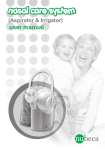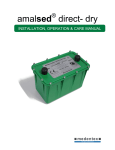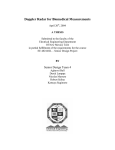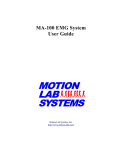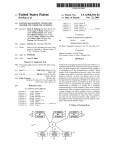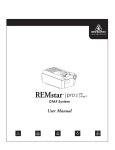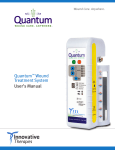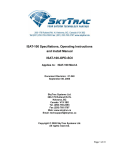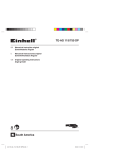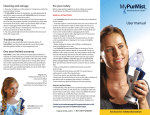Download Providence Home Services CPAP/BiPAP
Transcript
Providence Home Services CPAP/BiPAP Patient Education Guide CPAP/BiPAP Patient Education Guide Table of contents An introduction to your CPAP/BiPAP therapy .................................. 2 How to reach us .................................................................................. 2 What to expect ................................................................................... 3 Insurance and billing .......................................................................... 4 Your individualized prescription ....................................................... 5 About your CPAP/BiPAP ..................................................................... 6 Safety precautions .............................................................................. 7 Cleaning the CPAP/BiPAP unit and accessories ................................ 8 Replacement of supplies and parts ................................................... 9 Providence CPAP/BiPAP clinic........................................................... 10 Commonly asked questions ............................................................. 11 Patient rights and responsibilities ................................................... 15 1 An introduction to your CPAP/BiPAP therapy Welcome to Providence Home Services. We appreciate the opportunity to serve you, and we look forward to giving you excellent care. Your physician has prescribed either a continuous positive airway pressure (CPAP) or bi-level positive airway pressure (BiPAP) machine to treat obstructive sleep apnea or central sleep apnea. Therapeutic pressure is the pressure, determined by the sleep lab, that should best resolve your apnea periods and allow you to enter the restful stage of sleep known as rapid eye movement (REM) sleep. Everyone requires some REM sleep in order to feel renewed or rested. Our respiratory therapists will determine the proper style and size of mask to use with the CPAP or BiPAP, and they will follow your progress and help you make your CPAP therapy work for you. A respiratory therapist will also work with your physician to obtain everything you need for successful therapy. If you are having trouble with your CPAP unit, please call our Respiratory Therapy Department. The information in this packet is not intended to replace any advice given to you by your physician or care provider. You may also refer to your CPAP or BiPAP user’s manual for information. We hope that you will enjoy better sleep and health once you begin using your CPAP/BiPAP unit. How to reach us Providence Home Services phone numbers: Respiratory therapy department ................................................... 503-215-0419 CPAP/BiPAP voice mail............................................................... 503-215-0187 Customer service ..........................................................................503-215-4663 Outside the Portland metro area .................................................. 800-762-1253 Providence Home Services business hours: Monday through Friday, 8:30 a.m. to 5 p.m. Websites to assist you: www.cpap.com www.respironics.com www.sleepapnea.com www.sleep.com 2 CPAP/BiPAP Patient Education Guide What to expect At the initial set-up time, a respiratory therapist will program your CPAP/BiPAP unit with the therapeutic pressure prescribed by your physician. Any changes in pressure must be prescribed by your provider and made by a respiratory therapist. Here is some helpful information when beginning CPAP/BiPAP therapy: • Please allow two to four weeks (or even longer) to get used to the mask and pressure. It is very important that you allow yourself time to get used to the system and allow the system time to work for you. • Most people find that they need to use the interface (nasal mask, nasal pillow or full mask) regularly for at least two weeks before determining if it will work or not. • Your physician would like you to use your CPAP or BiPAP all night, every night. It may take time to work up to being able to use it all night. Be patient with yourself and with the system. Even though it may seem frustrating in the beginning, it is important to keep working with it. It does get better. ° If you go to bed with good intentions of using your CPAP or BiPAP all night, but you wake up after a few hours and feel you have to take it off, it is OK to take it off and go the rest of the night without it. The next night, you need to use it longer before taking it off. In this way you can train yourself to become accustomed to it. ° Two to four weeks is a good “getting used to it” period. • CPAP and BiPAP are most effective if you are able to sleep with them on for four hours or more each night. Most insurance companies require a minimum of four hours of usage per night. However, in the first few weeks it is important to concentrate on getting used to it. • Chances are, you are not going to see a drastic improvement in your obstructive sleep apnea symptoms right away. It may take some time to notice the benefits of CPAP/BiPAP therapy. • Most importantly, do not hesitate to call us at 503-215-0419 if you have any questions or problems with your CPAP/BiPAP. We are here to help you succeed with your prescribed treatment. • Periodically you may receive a replacement Smart Card/Scan Disk that keeps track of usage of your CPAP/BiPAP unit. (You may have a unit that doesn’t have this capability.) A postage-paid envelope will be provided for returning the card to us. 3 • You may also have a modem on your unit that will communicate to a web-based program. (You may have a unit that doesn’t have this capability) • To order replacement supplies (mask, headgear, tubing or filters), please call customer service. Supplies can be shipped directly to you, or you can pick them up from one of our offices: Providence Halsey Business Center 6410 NE Halsey, Portland 503-215-4663 Providence Salem Service Center 2508 Pringle Road SE, Salem 503-585-4027 Providence Hood River Service Center 1151 May St., Hood River 541-387-8923 Providence Vancouver Service Center 7723 NE Fourth Plain Blvd., Vancouver 360-816-7333 Providence St. Vincent Medical Center 9155 SW Barnes Road, Suite 736, Portland 503-215-4663 Call ahead to ensure your items are in stock. Our respiratory therapy team will work closely with you to ensure you have a positive experience. Please don’t hesitate to call us with any questions or concerns. Insurance and billing • Providence Home Services will bill your insurance company. • The CPAP/BiPAP units are monthly rentals. Depending on your insurance plan, you may be responsible for a co-payment on the monthly rental of the unit. • The supplies you will need to use with your unit include a mask, headgear, tubing and filters. You’ll need to purchase these supplies. Depending on your insurance plan, you may be responsible for a co-payment for the purchase of the supplies. • In some cases the insurance company will purchase the unit after a period of use. Usually the monthly rental fee is applied to the purchase price of the unit. • Most insurance plans will pay for a new mask every three to six months. You may be required to sign a financial waiver form accepting responsibility for payment if insurance denies the claim due to Medical necessity not met. 4 CPAP/BiPAP Patient Education Guide • CPAP/BiPAP masks are non-returnable and non-refundable once the package has been opened. We cannot credit your account for the cost of the mask once you have opened the package. • If you have any questions about billing or your account, please call customer service. Your individualized prescription Pressure (prescribed by your physician) __________ cmH2O Ordering physician ____________________________________ Phone ____________________________________________ CPAP/BiPAP unit _______________________________________ Mask type ____________________________________________ Humidifier (prescribed by your physician) Cool____________ Heated ____________ Model ____________________________________________ Date of set-up _________________________________________ Respiratory therapist___________________________________ Phone ____________________________________________ Email______________________________________________ Date pressure changed _________________________________ (prescribed by your physician only) Date mask changed/replaced ___________________________ New mask type ____________________________________ 5 About your CPAP/BIPAP Providence Home Services primarily uses Respironics products. The following may not depict the exact model you have, so please refer to your users’ manual for precise product information. • On/standby/off button This button turns your unit on and off. The Respironics units will automatically turn on once you have your mask on and are breathing through the system. • Heat button or turn knob Turn on your heated humidifier base (if applicable). Your physician must order the equipment. If you have the Respironics heated humidifier and a CPAP/BiPAP unit with the C-flex version, you must turn on the heat before turning on the unit. If you don’t do this, the heat may turn off in the middle of the night. If your model does not have this feature, it will require an independent heated humidifier system. • C-Flex/A-Flex/Bi-Flex C-Flex is a comfort feature on a CPAP that provides pressure relief during exhalation, if activated. A-Flex is a comfort feature on an Auto CPAP that provides pressure relief at the end of inhalation and the start of exhalation, if activated. Bi-Flex is a comfort feature on a BiPAP that provides pressure relief at the end of inhalation and the start of exhalation, if activated. • Ramp button When you first turn on your CPAP/BiPAP, the pressure will be at the full therapeutic level prescribed by your doctor. It may take you some time to get used to this pressure, especially if you require higher pressures. The ramp feature allows you to slowly get used to the pressure. This feature gradually builds up the pressure over a preset amount of time until it has reached the therapeutic level. You may activate the ramp feature as many times as you wish. To deactivate the ramp, you must first turn off the CPAP/BiPAP unit. The respiratory therapist programs the ramp time during the initial set-up. If you would like the ramp time changed, please contact your respiratory therapist. You may change the minimum ramp pressure yourself. Please refer to the user/patient menu in your users’ manual. 6 CPAP/BiPAP Patient Education Guide • Left and right scroll buttons These allow you to scroll through the user/patient menu. Please refer to your users’ manual. • Display window This window allows you to see your pressure, whether the blower is on or off, and the patient menu items. You may see any error codes or alarms here as well. Please refer to your users’ manual. If you use an M-series model, lift the lid to see the display window. • Hose connection Connect the tubing/hose to the unit. If you are using the heated humidifier by Respironics, you will connect the chamber here. • Smart Card/Scan Disk Your CPAP/BiPAP unit may have a Smart Card/Scan Disk feature. The Smart Card/Scan Disk is a small plastic card (the size of a credit card) embedded with a computer chip. The card/disk allows the respiratory therapist and your doctor to monitor usage of the unit. The Smart Card/Scan Disk also allows the respiratory therapist to change your settings, such as pressure (prescribed by your doctor) and ramp time, without the need for an appointment. Please refer to your users’ manual for more detailed information. If you are unable to locate your users’ manual, please contact respiratory therapy. Safety precautions • Do not immerse your CPAP/BiPAP in water. • Unplug your CPAP/BiPAP from the outlet before cleaning the outside of the unit. • Always make sure your CPAP/BiPAP unit is clean before plugging it in. • Do not take your CPAP/BiPAP unit apart for any reason. Instead, please call respiratory therapy for assistance. • Do not plug your CPAP/BiPAP unit into the same outlet being used for other appliances. 7 Cleaning the CPAP/BIPAP unit and accessories • Wash all supplies in warm soapy water. Use liquid hand soap or regular dish soap. You may also use alcohol-free baby wipes. • Do not use scented soaps if you are bothered by fragrances or smells. • Do not use any alcohol or chlorine bleach. Alcohol may wear down the material of your mask or nasal pillows faster. The smell of chlorine may irritate your airways. Daily: • Wash the mask or nasal pillows with soap and water or baby wipes. • Replace the water in your humidifier (if you use one). Weekly: • Wash your tubing, mask and headgear. • Wash your humidifier reservoir (if you use one). • Rinse out your dark spongy pollen filter with water. Do not use soap on your spongy filter. Please note: The spongy pollen filter needs to be completely dry before you put it back into your CPAP/BiPAP unit. Monthly (if used): • Replace the disposable white micron pollen filter. • Use a slightly damp cloth to wipe off your CPAP/BiPAP unit. CAUTION: To avoid possible electric shock, unplug your CPAP/BiPAP unit before wiping it down. 8 CPAP/BiPAP Patient Education Guide Replacement of supplies and parts We recommend the following replacement schedule: Monthly: • White disposable micron pollen filter Every three to six months: • Mask or nasal pillows • Headgear Yearly: • Tubing • Humidifier chamber (if you use a humidifier) • Dark spongy pollen filters To order supplies, please contact customer service. If you call in your order one to two days ahead of time, we can have your supplies ready for you to pick up at one of our locations. Medicare will allow you to replace the following: • Pillows or cushions – two per month • Nasal mask or full face mask – one per three months • Headgear/chinstrap – one per six months 9 Providence CPAP/BiPAP clinics locations Due to staffing limitations, we can assist customers on a walk-in basis only at the Halsey location. Appointments are required at all other sites. Please call for an appointment so that staff will be available to answer your questions and help with your CPAP/BiPAP equipment needs. Providence Halsey Business Center Storefront only; no patient appointments 6410 NE Halsey St., Portland Monday – Friday 503-215-4663 Providence St. Vincent Medical Center 9155 SW Barnes Road, Suite 410, Portland By appointment only • Monday – Friday 503-215-0491 Home Services at The Oregon Clinic 1111 NE 99th Ave., Suite 200, Portland By appointment only • Monday – Friday 503-215-0419 Providence Hood River Service Center 1151 May St., Hood River By appointment only • Monday – Friday 541-387-8923 Salem Service Center 2508 Pringle Road SE, Salem By appointment only • Monday – Friday 503-585-4027 Vancouver Service Center 7723 NE Fourth Plain Blvd., Vancouver By appointment only • Monday – Friday 360-816-7373 Appointments for all locations except Hood River are made through our main office at Halsey Business Center. 10 CPAP/BiPAP Patient Education Guide Commonly asked questions Q. Why is air blowing in my face and/or eyes? Why are my eyes dry and/or sore? A. Your mask does not fit well. It could be too loose, too big or too small. Try repositioning the mask on your face and adjusting the straps on the headgear. You may also try soaking the mask in one part white vinegar to two parts warm water for 20 minutes to ease mask “stiffness.” If these remedies do not work, please call respiratory therapy to have a staff member check the size of the mask. Q. Why does my face feel sore? Why do I have facial redness or skin irritation from contact with the mask or nasal pillows? A. The forehead pads and tightly pulled headgear straps can cause tenderness on the forehead or around the cheekbone area. Try re-adjusting the mask and repositioning the headgear. Experiment with a barrier, such as 3M’s Micropore tape or Squibb’s Duoderm, between your skin and the mask to ease skin irritation. Call your respiratory therapist to check the fit of your mask. Q. Why am I getting nasal, ear or sinus pain? A. You may need to be checked for a sinus or middle ear infection. Stop using the CPAP/BiPAP unit, and contact your primary care physician. Q. Why am I occasionally experiencing nosebleeds and/or sneezing since using my CPAP/BiPAP? Why am I getting a stuff y, dry nose or a burning sensation in my throat? A. The pressure may be irritating and/or drying out your nasal passages and sinuses. Try using a nasal saline spray or an aloe vera gel. Products such as Ocean Spray, Nasal Moist Gel, Nature Care Gel and Nose Better are available without a prescription. If the nose bleeds or sneezing persists, contact your respiratory therapist to discuss obtaining a chinstrap or possibly obtaining a humidifier to use with your CPAP/BiPAP. If you are currently using a humidifier, try increasing the setting. Q. Why am I getting headaches? A. Early-morning headaches may be caused by a need for more oxygen in your blood. Your doctor may order an increase in CPAP/BiPAP pressure or may order supplemental oxygen. Other possible causes include high air pressure or cold air temperature. Pulling headgear too tight may cause headaches. Contact your respiratory therapist to evaluate your situation. 11 Q. Sometimes I feel like I can’t breathe or that I’m suffocating. Why is this happening? A. The pressure may be set too low. Occasionally the mask makes some people feel claustrophobic. Contact your respiratory therapist for advice. Q. My nose is cold due to the room temperature. What should I do? A. Place the tubing under the bed covers to reduce heat loss and/or turn up the room temperature. Q. Why does water collect in my mask and tubing? A. In cool bedrooms, moisture from your breath may cause condensation in your mask and tubing. If you use a heated humidifier, the cooling moist air in your tubing will cool down and become liquid. Try decreasing the temperature on your heater or insulating your CPAP/BiPAP tubing. Another solution is to put your CPAP/ BiPAP and heated humidifier closer to (but not directly on) the floor. This will allow gravity to pull some of the moisture back into the water chamber. Q. I’ve noticed the return of loud snoring, drowsiness and sleepiness or apnea periods. What could be the cause? A. You may need a mask refit, a pressure change or an alternative therapy. Also, not using the equipment as prescribed could lead to these problems. Contact your respiratory therapist or physician to evaluate the therapy. Q. Why do I sometimes wake up with air in my stomach and/or with the feeling of gas? A. You may be swallowing air. This is a very common experience when you first begin to use the CPAP/BiPAP. This usually goes away once you are used to the pressure. If the problem persists, notify your respiratory therapist or your physician. Use only one pillow. Use a pillow that allows your head to tilt back slightly. You may try raising head of bed 20 degrees unless your doctor states otherwise. Q. Why do I have air coming out of my eye ducts when I use my CPAP/BiPAP? A. In most people, the eye ducts are not open to the sinuses. In rare instances, some people do have ducts that are connected to the sinuses. If you have problems with your eye ducts, please contact your physician for advice. Sometimes nothing needs to be done at all. 12 CPAP/BiPAP Patient Education Guide Q. I don’t remember the pressure being this strong in the sleep lab. Why does the pressure feel so strong? A. In the sleep lab, the technician increased the pressure to your therapeutic level after you fell asleep. It takes time to get used to the pressure. Allow yourself several weeks to get used to the prescribed pressure. Practice taking slow breaths through your nose while keeping your mouth closed. If you can’t tolerate the pressure, contact your respiratory therapist for additional recommendations. Q. Why is my mask leaking? A. Your mask does not fit well. Common causes include the position of the mask over your nose, the fit of the headgear or the size of the mask. Q. Why does my mask make odd vibration noises on my face? A. Your mask may be loose or in need of cleaning. Your respiratory therapist can also check for any defect in the mask material. Q. Air from the CPAP/BiPAP unit seems warm and/or smells musty. What can I do? A. Replace the white micron pollen filter (if you use one) and/or clean the spongy pollen filter. Move the unit away from the bed or curtains to prevent the air flow from being blocked. At night, turn down the heat on the humidifier and the room temperature. Place the unit on a stool near the floor where the air may be cooler. Q. I was told I would feel like a whole new person after a few nights with the CPAP/BiPAP. Why don’t I feel that way yet? A. This is a common myth. It takes weeks to months to notice a significant difference in energy. Watch for small changes in your daily activities. Note how often you fall asleep during the day or while watching TV. Q. How do I care for my CPAP/BiPAP and supplies? A. Keep your mask and tubing clean. Prevent the growth of bacteria, which may cause facial skin infections. If you use a humidifier, keep your tubing and water chamber clean to prevent growth of bacteria and mildew. Q. How often can I get new supplies? A. Most insurance plans cover the purchase of a new mask and headgear every six months and new tubing once a year. Medicare authorizes a new mask every three months and new headgear every six months. 13 Q. The mask alarm repeatedly goes off. What is happening? A. Your mask may need to be repositioned and your headgear re-adjusted. Also, check the connection between the tubing and the unit, and check for holes and cracks in the tubing. Turn off the mask alarm until the problem has been addressed. Q. Why does the CPAP/BiPAP unit alarm shut off and display an error message? A. There may be a malfunction of the motor, rotor or main PCA board. Please note the error code number and contact respiratory therapy as soon as possible. Never try to repair the unit yourself. The CPAP/BiPAP unit is considered medical equipment and must be repaired by a professional. Q. The unit is hot to the touch. What does that mean? A. The motor may be “suffocating” or malfunctioning. Replace the white micron pollen filter (if you use one), and clean or replace the spongy pollen filter. If the problem persists, unplug the unit and contact respiratory therapy. Q. When will I receive another Smart Card/Scan Disk? A. The Smart Card/Scan Disk records data on usage of your unit. We will check the data from time to time. Throughout the year, you’ll receive a new Smart Card/Scan Disk in the mail. You will then need to send your old card back to us. If you have any questions or concerns not addressed in this booklet, please don’t hesitate to contact your respiratory therapist. The therapist who initially set up your CPAP/BiPAP unit may not be available at the time you call. In this case, you will be asked if you would like to leave a message for this therapist or if you would like to speak with another therapist. 14 CPAP/BiPAP Patient Education Guide Patient rights and responsibilities Patient rights In keeping with the Providence core values of respect, compassion, justice, excellence and stewardship, we are committed to your rights as a patient. You have the right to: • • • • • • • • • • • • • • • • Receive considerate and respectful care Have your pain appropriately assessed and managed as needed Know the doctor who is coordinating your care Be informed of the services offered by Providence Home Services Know the name of the person supervising your care and how to contact this person Obtain complete information (oral or written) about your continuing health care requirements from your doctor or Providence Home Services staff Share in decision making and care planning Refuse treatment and to be informed of the medical consequences of your refusal Receive coordinated care and be informed when services are provided by another agency Be assured of privacy and confidentiality regarding discussion and provision of your health care Expect confidentiality regarding your records and communications Refuse to participate in research projects or procedures Be advised of expected charges and payment requirements Examine your bill and have it explained, regardless of the payment sources Be cared for by professionals who respect you, your family and your property Seek assistance in finding another agency to serve you and in having the services transferred to the agency • Receive a list of written rights and responsibilities in advance of treatment. • Expect Providence Home Services to respond in a timely manner, when possible, to your request for services • Voice any complaints or grievances about services provided by staff and expect complete follow-up • Access the Department of Health directory of licensed agencies • Be told who owns and operates Providence Home Services • Access your own medical record information and have questions and concerns addressed clearly and honestly 15 Patient responsibilities We believe that you and your family share with us in the responsibility for your care. We ask that you keep an open line of communication with staff so that we can provide the best care for you. You have the responsibility to: • Participate actively in decisions about your health care • Work with our staff to assess and manage any pain you may have • Be as accurate and complete as possible regarding your medical history and treatment • Notify your doctor or a Providence Home Services professional if you are concerned about a treatment, if you do not understand a treatment, or if you cannot or will not follow a certain treatment plan • Inform Providence Home Services promptly of any changes in your doctor, caregiver, insurance or other payer sources • Use Providence Home Services property and equipment only for its intended purposes • Examine your bill and ask any questions you may have regarding charges or method of payment • Work with staff to handle your financial obligations to Providence Home Services in a timely manner • Be considerate of Providence Home Services staff, but be sure to call us when you need assistance • Inform Providence Home Services if you enter a hospital or any other care facility • Keep weapons and/or animals in appropriately secured areas • Please refrain from smoking while staff is providing care in your home 16 OUR MISSION As people of Providence, we reveal God’s love for all, especially the poor and vulnerable, through our compassionate service. OUR CORE VALUES Respect, Compassion, Justice, Excellence, Stewardship www.providence.org/homehealth Providence Health & Services, a not-for-profit health system, is an equal opportunity organization in the provision of health care services and employment opportunities. 13-00795 TPR 4-13
























